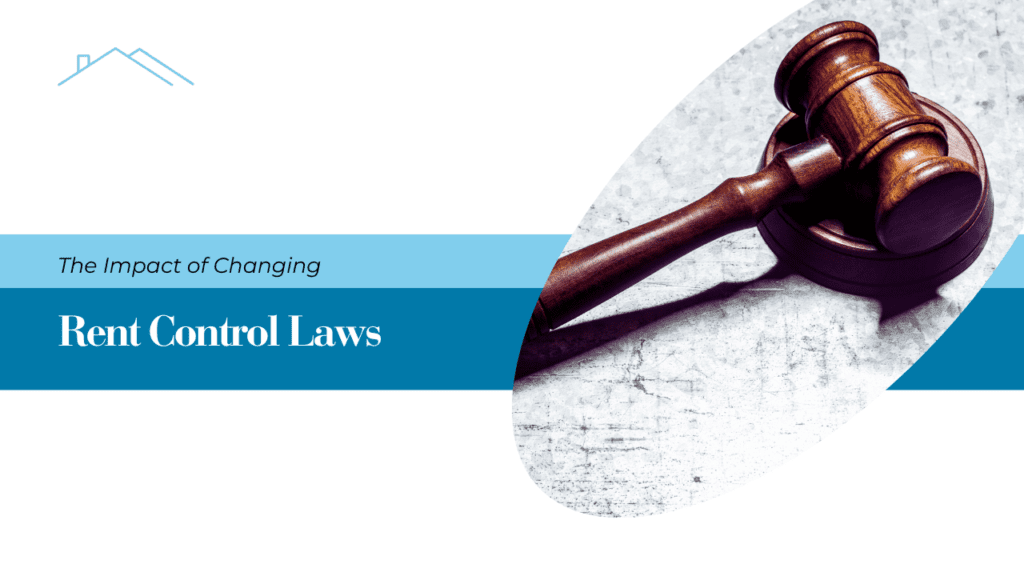
Rent control has been a hotly debated and discussed issue in San Diego, and changing rent control laws have had an impact on local landlords. They’ve impacted rental property owners all across the state, especially since The Tenant Protection Act went into effect in 2020.
Let’s take a look not only at what the rent control laws are, but at how they’ve impacted the market and the people in that market.
Current Caps on Rent in San Diego
If you’re renting out a property in San Diego, or anywhere in California, you’re likely aware of what the limits are when it comes to raising the rent. You cannot increase what you’re charging by more than 5% plus the cost of inflation, which is set by the Consumer Price Index (CPI). Whatever the CPI happens to be, the increase cannot exceed 10%.
Right now in San Diego, the most a property owner can increase the rent is 8.6%, and that cap will remain in effect until the next adjustment in August of 2025.
There are exceptions. Most rent control laws, whether local or statewide, impact properties that are at least 15 years old. These stabilization laws focus more on multifamily units, leaving single-family homes and condos exempt.
Even if you’re renting out a property that’s exempt from current rent control laws, there’s going to be an impact on how you approach the market and what you’re charging.
Implications for Rental Property Owners: Setting Rents
Since its implementation, The Tenant Protection Act has aimed to create greater stability for renters who find themselves struggling to afford rent in an increasingly expensive market. When you’re setting your initial rent or raising that rent at renewal time, you are likely thinking about rent control laws and the restrictions that exist.
You’re renting out a property in San Diego because you want to make money. In order to make money, you need to raise the rent on your property pretty consistently from year to year.
So, if you’re operating under the rent control laws, how can you continue to make money?
Here are some things to think about.
- Generally these rent control laws mean you won’t be able to raise your rent more than seven or eight percent every year. This law is in effect for 10 years, but will most likely be reinstated when that period comes to a close.
- The CPI changes annually, so landlords will be required to understand what it’s been set at before they add their own five percent if they’re planning to raise rent by the maximum amount the law allows.
- When you have an investment property that’s subject to rent control laws, you have to be strategic about how you price the property, attract tenants, and negotiate lease renewals.
To maximize the return you earn on your rent-controlled investment, we recommend:
- Strategically pricing your vacant property. The rent control laws do not limit what you can set your rent at when the property is vacant. You’ll want to study the market, and remember that you’ll need to compete with those properties that are subject to rent control. Their prices will be lower. But, you will want to avoid underpricing your rental property at the point that you list and market it. Otherwise, you’ll have a difficult time increasing the rent year after year because you’re bound by those rent control limits.
- Screen tenants carefully. You will likely have them in place for longer than a one-year lease. In a market without rent control, tenants feel free to look around at lease renewal time. They may find something cheaper and it’s worth it to them to move. With rent control in place, tenants know their rent is capped. They’re more likely to stay in place longer. Plus, the just cause eviction laws make it difficult to evict a tenant without cause. You’ll want to know you’re placing great residents.
- Always partner with local San Diego property managers before you invest in a property, set a rental value, or raise your rents at renewal time. The tenant protections make the management of your property more challenging. It’s an excellent reason to work with property managers.
Rent control impacts each property a little differently. How you respond to it depends on where you are, whether your property is included or exempt, and what you need from your property in terms of earnings and performance.
What if My Property is Exempt?
When you find yourself renting out a single-family home or a multi-family unit that’s new and not bound by rent control restrictions, we recommend still staying in line with rent control caps.
Raising the rent more than 10 percent even if the rent control laws do not cover you is going to leave you vulnerable. Tenants are not going to pay more than they feel they should, even in a market like this one, where rents are high.
You need to communicate the parameters of this law with your tenants, who will not necessarily understand whether rent control applies to them when they rent your property.
If you’re included in the rent control law, you’ll want to put something in your lease agreement to reflect that. It’s even more important to adjust your lease agreement if you’re exempt from the law. You want to notify your residents that the property they’re living in does not fall under this new law. This will eliminate confusion and disputes.
Long-Term Impact on Your San Diego Investment Property
Real estate investors typically don’t like rent control because it affects their profitability. The existing statewide rent control laws, many people have argued, may have driven investors out of California markets and into other states where there are less restrictions on what they can charge and when they can evict or take back possession of their property. It’s possible investors will look to commercial properties rather than residential homes.
With challenges, there are opportunities. If you’re like most property owners worried about the financial impact of rent control on your investment property, remember that you still own a valuable asset in a competitive market. San Diego property values are not going to plummet anytime soon. When you have good tenants in place, even modest rent increases will contribute to your earnings and keep your property stable.
The Financial Implications for San Diego Property Investors
Changes to rent control laws significantly affect rental income, operating costs, and long-term value. Here are some areas where landlords may feel the impact:
- Reduced Rental Income
If stricter caps on rent increases are implemented, landlords may struggle to keep up with inflation, increasing operational costs, or property maintenance expenses. This could directly diminish your profit margins.
- Volatility in Property Value
Rent-controlled properties often carry lower market valuations, especially for real estate investors who depend on cash flow. Properties in San Diego subject to expanded rules may see a slight dip in appeal, limiting opportunities for future sales or refinancing.
- Administrative Challenges
Adhering to additional compliance criteria (for example, stricter eviction rules or proposed restrictions on raising rent after renovations) can create administrative headaches, requiring landlords to stay vigilant and organized to avoid penalties.
It’s clear that rent control policies can reshape property investment strategies. Adapting to these changes doesn’t mean losing out—savvy landlords who understand the system often remain profitable and find other advantages through long-term tenants and strategic planning.
How San Diego Landlords Can Adapt to Changing Rent Control Laws
Navigating the complexities of rent control doesn’t have to be overwhelming. Here are actionable steps to help you stay ahead:
- Stay Updated on Legislative Changes
Follow all industry updates regarding San Diego Rent Control laws. Subscribing to landlord associations or attending city council meetings can also provide valuable insight. Partner with a good property manager. We are always happy to talk to owners and investors who are confused by rent control laws.
- Perform a Portfolio Review
Assess the financial health of your properties. Understanding your rental income, cash flow, and margins will empower you to make smarter decisions. Are there properties no longer maximizing ROI? These may need adjustments.
- Focus on Tenant Retention
Encouraging tenant longevity can deliver a lot of value in a rent-controlled market. Long-term tenants reduce turnover, save on re-renting costs, and often create a more stable income stream. Provide value to renters with excellent maintenance and prompt communication.
- Invest in Upgrades Thoughtfully
While major renovations might not translate to immediate rent increases, they can enhance your property’s appeal over time. Think in terms of quality-of-life improvements valued by tenants, such as energy-efficient appliances or upgraded common areas.
- Lean on Property Management Experts
We are here to help. Streamlining your operations through professional property management services can help mitigate the administrative challenges brought on by rent control laws. They can also ensure you remain compliant with local ordinances.
- Diversify Your Portfolio
Consider venturing into areas not as heavily impacted by rent control laws, such as short-term rental markets or commercial property investments. Geographic diversification within San Diego could also help insulate your portfolio from changing regulations in specific districts.
 Let’s talk about what rent control laws mean to you and your properties specifically. Contact us at Chase Pacific Property Management & Real Estate Services.
Let’s talk about what rent control laws mean to you and your properties specifically. Contact us at Chase Pacific Property Management & Real Estate Services.
